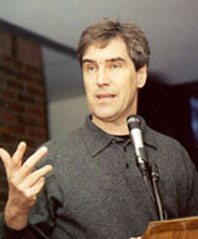Iggy observed: do old UK, US careers hint at arduous destiny in Canada?
Apr 2nd, 2010 | By Citizen X | Category: In Brief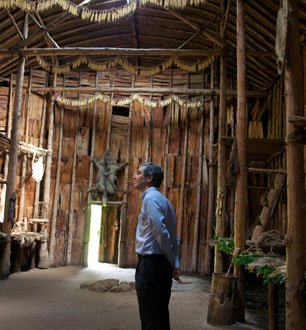
Michael Ignatieff, leader of the Liberal Party of Canada inside the Turtle Clan long house at Crawford Lake, Ontario. Aboriginal Day June 21, 2009. Photo by: Radey Barrack.
Geoffrey Stevens is a former Ottawa columnist and managing editor of the Globe and Mail who, now comfortably into his senior-citizen-hood (born 1942), teaches political science at Wilfrid Laurier University and the University of Guelph. He also writes for StraightGoods.ca – “Canada’s leading independent online newsmagazine.”
Stevens’s latest StraightGoods column is entitled “Elections are lost, not won … Liberals wait for the Harper government to defeat itself.” Commenting on the “Conférence libérale des penseurs” in Montreal last weekend, he suggests: “Whether Montreal helps the Liberals to position themselves as that respectable receptacle for alienated voters will depend on how Ignatieff and his caucus proceed from here.”
Michael Ignatieff in particular, Stevens goes on: “has to persuade the people that he is a legitimate prime minister-in-waiting and not merely a rather befuddled intellectual posing as a political leader.”
I too found my ultimate thoughts about the thinkers’ conference in Montreal focusing on the still rather vague public persona of Mr. Ignatieff in Canadian politics (as opposed to his career in Anglo-American higher journalism, where the reputation that preceded him was made).
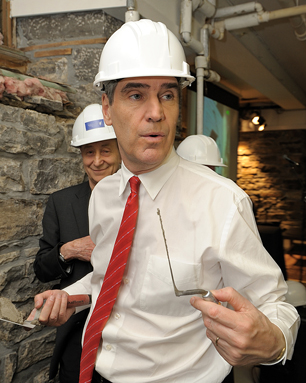
Michael Ignatieff helps repair stone walls at Saint Brigid’s Centre for the Arts and Humanities, on St. Patrick Street in Ottawa, April 2009. Supervising the new leader of the Liberal Party of Canada is architect Barry Padolsky on the left. Photo: John W. Macdoanld.
Even if you take at face value the quasi-partisan Toronto Star editorial on the Montreal conference, “Liberals start an adult conversation,” the key practical question is of course where will Mr. Ignatieff be leading this conversation? And will enough Canadian people – in enough regions of this diverse country – be attracted to his “adult” leadership? (So far, as the latest weekly EKOS poll explains: “the Liberals are back down to their core support, and it isn’t budging. Michael Ignatieff is not connecting with Canadians in terms of policy or personality.”)
My time for such exercises not being infinite, I finally found myself focusing here on what is probably Ignatieff’s highest achievement in his earlier public intellectual career – his 1998 biography of “the philosopher Isaiah Berlin, one of Britain’s intellectual eminences,” simply entitled Isaiah Berlin: A Life. What does his reputation here, as it stood a dozen years ago (in faraway places, the Conservative attack ads will remind us) say about just what may or may not happen to Iggy’s ambitions in the more sordid real world of Canadian politics today?
1. Iggy takes Berlin …Â according to Kenan Malik

Michael Ignatieff’s 1998 biography of “the pre-eminent philosopher of modern liberalism,” Isaiah Berlin, was probably the height of his achievement as an Anglo-American “public intellectual,” before he began his later-life career as an aspiring Canadian politician.
To start with, I looked at the review of Ignatieff’s Berlin biography by Kenan Malik, in the admirable UK newspaper known as The Independent, 25 October 1998. The late Isaiah Berlin (d. 1997), Malik urges, “has come to be seen as the pre-eminent philosopher of modern liberalism,” even if “Berlin’s liberalism was highly ambiguous.”
Moreover, Malik goes on, there are “ few people better equipped to chew over these” ambiguities “than Michael Ignatieff,” who during “the last decade of Berlin’s life… held regular conversations” with the great man, “in which Berlin reminisced at length about his life and work. The result is an intelligent and sympathetic biography. But while Ignatieff is not blind to the inconsistencies of Berlin’s philosophy, his affection for the man, and empathy for his ideas, constrains his ability fully to explore its more problematic aspects.”
Mmmm …Â There do still seem times, even today, when Michael Ignatieff’s “ ability fully to explore” the “more problematic aspects” of a great many things seem constrained, by something.
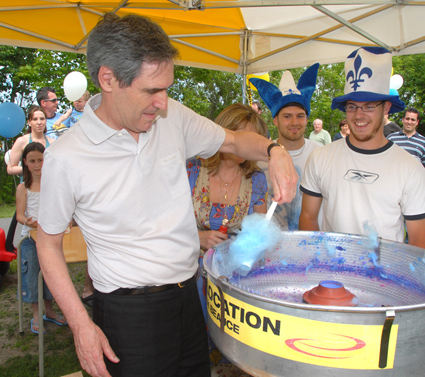
Liberal Leader Michael Ignatieff, at least trying to get to know voters better in la belle province – homeland of the first people who called themselves Canadians, June, 2009.
On the other hand, this may just show that somewhere deep inside him there is a real democratic politician (and especially a Canadian politician?) struggling to surface. And if this is true, it could be better news for Canadian Liberalism than most of us seem able to conceive at the moment?
A final short paragraph from the Mailk review seems perhaps similarly interesting: “For Ignatieff, it is Berlin’s acceptance of the conflicting nature of human desire that makes him a truly great and humane thinker. For both men the human condition is tragic in the sense that the achievement of one aim always entails a loss somewhere else.”
At least many among the Canadian people, it might be argued, have a similarly tragic view of the human condition – whether it is true or not! (Or, as Malik asks: “But what if the contradictions lie not in the human condition but in Berlin’s own philosophy?” )
2. “Michael Ignatieff: Tracing Isaiah Berlin” (from Publishers Weekly) …
Just over a month after Kenan Malik’s October 1998 review, another article on the author (“Michael Ignatieff, the Canadian-born academic turned London-based writer and TV host”) appeared in the New York-based Publishers Weekly. It drew on “a breakfast lecture”by Ignatieff at the Carnegie Council for Ethics in International Affairs in Manhattan, and a subsequent “interview at his [American] publisher’s office” (on Fifth Avenue).
Again, the article focused on the recently published Isaiah Berlin: A Life – “a striking match of subject and biographer, two expatriates with eclectic intellectual interests and multiple professional circles.”
(Berlin was born in the old Russian empire in 1909, but moved with his family to the UK in 1921. Ignatieff was born in Toronto in 1947, to a father who had also been born in the old Russian empire, and a mother born in Canada. Ignatieff moved to the UK in 1978, then to the US in 2000, and finally back to Canada in 2005.)
A few quotations from the 30 November 1998 article in Publishers Weekly still seem to offer a little food for thought, at the start of April 2010:
* “‘I learn from books, but I learn most from raw, painful experience,’ he [Ignatieff] tells PW.” (And, you might say, he has had enough “raw, painful experience” since he became leader of the Liberal Party of Canada last spring to teach him quite a lot – about something … )
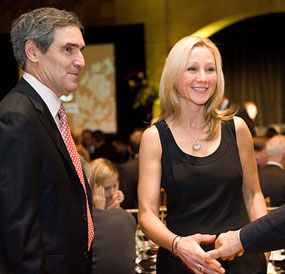
Iggy and Belinda ... just friends ... bumping into each other, and others ... Canadian International Council Gala Dinner at the Royal Ontario Museum in Toronto, 2008.
* The “slightly left-of-center Ignatieff” was/is not entirely comfortable with Isaiah Berlin, “whom he criticizes somewhat for equivocations on volatile issues like Vietnam and McCarthyism.”
* “Berlin, he [Ignatieff] adds, ‘lightened me up. I’m Russian and have a tendency toward gloomy self-absorption … I now feel rooted and happy in London,’ says Ignatieff, who nonetheless calls himself a Canadian writer … ‘I don’t think I could survive as an independent writer in the US.”
* “‘I realized that cosmopolitanism is the privilege of people with passports,’ says Ignatieff. ‘Isaiah should have been a cosmopolitan, but he was very scornful of it. He knew: you gotta have a home.’”
3. Iggy and Pierre Trudeau … an updated Liberal vision of Canada?
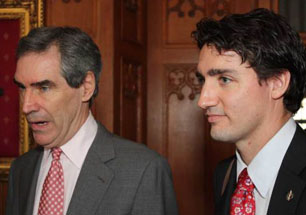
Michael Ignatieff with Justin Trudeau, April 2009 – from “Iggy’s Coronation Countdown,” Macleans.ca.
Many of Michael Ignatieff’s early admirers in the Liberal Party of Canada – the people who, in one way or another, urged him to come back to his home and native land and get his hands really dirty in the internecine warfare of Canadian federal politics – apparently hoped he would return the sometime natural governing party to its heights under the home and native public intellectual, Pierre Elliott Trudeau.
In fact, as a public intellectual Trudeau had nothing quite like Isaiah Berlin: A Life to his credit. He had traveled – even more widely and exotically than Ignatieff, perhaps. But he never made a name for himself in the United Kingdom or the United States (or even France), before he became probably the most unusual prime minister in the history of the 1867 Canadian confederation.
On the other hand, Pierre Trudeau was in some degree “a Canadian writer,” just like Michael Ignatieff. And, unlike Iggy, most of what he wrote about before his Ottawa political career began in earnest actually involved Canada itself. (Probably the best example in English is the collection of previously published occasional essays republished in early 1968, during his Liberal leadership campaign, under the title Federalism and the French Canadians.)
Trudeau the public intellectual, that is to say, came to Canadian politics with a long-meditated vision of the Canadian future (which finally saw some degree of the light of day, arguably enough, in the Constitution Act 1982). The closest Ignatieff gets to such a thing is his 2009 book, True Patriot Love – which prompts at least vague impressions of having been concocted after he had decided to return to his home and native land to pursue a political career. Iggy brings a cosmopolitan grasp of the depths of “modern liberalism” to his leadership of the Liberal Party of Canada, but not exactly any in-depth pondering of particular Canadian problems.
![IUBC Photo by Adrian MacNair, licence under Creative Commons Attribution, taken “rather by surprise at around 3:15 pm [January 2010] while standing in a very long lineup waiting for Michael Ignatieff to arrive at UBC in Vancouver ... When I spotted him he was barely four feet away, and I whipped my camera out so suddenly that at first I startled him. Then he smiled, posed for the photograph, and then extended his hand for a handshake.”](http://www.counterweights.ca/blog/wp-content/uploads/2010/04/oiggy07.jpg)
Photo by Adrian MacNair, licence under Creative Commons Attribution, taken “rather by surprise at around 3:15 pm (January 2010 while standing in a very long lineup waiting for Michael Ignatieff to arrive at UBC in Vancouver ... When I spotted him he was barely four feet away, and I whipped my camera out so suddenly that at first I startled him. Then he smiled, posed for the photograph, and then extended his hand for a handshake.”")
Second, with both this and the great surge of late 20th century “globalization” in mind, it is arguable that what Ignatieff the born-in-Canada public intellectual with prominent experience in both the United Kingdom and the United States brings to the table is more suited to the needs of Canada in the early 21st century. Or, Trudeau’s Liberal vision of Canada (also largely embraced by both Jean Chretien and Paul Martin) does need some serious updating nowadays. And given his unique combination of Canadian and international backgrounds, Michael Ignatieff might be uniquely suited to deliver what is needed. (Or might not be too, of course.)
4. From philosopher king to Mackenzie King … can Iggy do it all by himself?
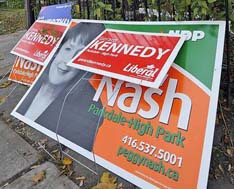
Under Michael Byers' proposal, only one campaign sign would be necessary for the New Democrats and Liberals.
I myself need to very quickly end my speculations here – in what is still supposed to be a posting “In Brief.”
Whatever else, there is very little sign as yet that Michael Ignatieff is going to be able to deliver an updated Liberal vision of Canada – that will finally bring the former “natural governing party” back into power in Ottawa, where it still thinks it belongs. Again, as Frank Graves at EKOS explains in his firm’s April1, 2010 weekly opinion poll report: “The Liberals had a terrible week in the House of Commons, with an embarrassing defeat caused by their own lack of organization … They had a somewhat better weekend with their policy conference in Montreal … However, the Liberals are back down to their core support, and it isn’t budging. Michael Ignatieff is not connecting with Canadians in terms of policy or personality.”
Vancouver Sun columnist Barbara Yaffe also pointed quietly to an important regional flaw even in the Montreal policy conference: “At the Grit policy gathering … reporters, columnists and camera people – mostly from Montreal, Toronto and Ottawa [italics mine] – have been treated to buffet-lunches and endless coffee.” Frank Graves’s latest EKOS poll similarly shows that the New Democrats are actually running somewhat ahead of the Liberals in the Vancouver metropolitan region (even if this is not quite true in any of British Columbia, Alberta, or Saskatchewan/Manitoba, this past week at least).
If the only serious way ahead for the current Canadian cause of progress is some kind of detente or cease-fire between the (strong-in-Eastern-Canada) Liberals and (strong-in-Western-Canada) New Democrats (as, eg, Michael Byers at the University of British Columbia has urged), there are those who argue that Michael Ignatieff’s old Toronto college roommate, Bob Rae (former first NDP premier of Ontario, but now a federal Liberal), is the more likely new Canadian visionary to bring this off.
Ignatieff and not Rae is the current Liberal leader, however, and that is almost certainly not going to change before the next Canadian federal election, whenever that may finally happen.

Michael Ignatieff and Bob Rae, former University of Toronto roommates turned parliamentary rivals, ham it up at their alma mater in 2002. Image credit: Susan King.
And besides, who knows? There seems at least a very slight chance that further big surprises are in store for we jaded observers of Canadian federal politics. A Globe and Mail report on last weekend’s thinkers’ conference in Montreal was headlined: “Liberals sowing seeds of a new style of democracy, Ignatieff says … Pointing to conference’s online, collaborative approach, Grit Leader eschews ‘command and control’ era of federal leadership.”
Pursuing a philosophy of this sort could conceivably lead to some new Liberal vision of Canada that includes the NDP (and/or the Green Party too?).
And that actually could win Iggy a place of honour in the long political history of the land of his birth (from which, again, as the Conservative attack ads like to remind us, or did at some point, he has been absent for so much of his adult life – though, arguably enough, perhaps for some higher purpose, like Moses in the land of Midian, gradually getting up the nerve to tell old Pharaoh to let his people go).
